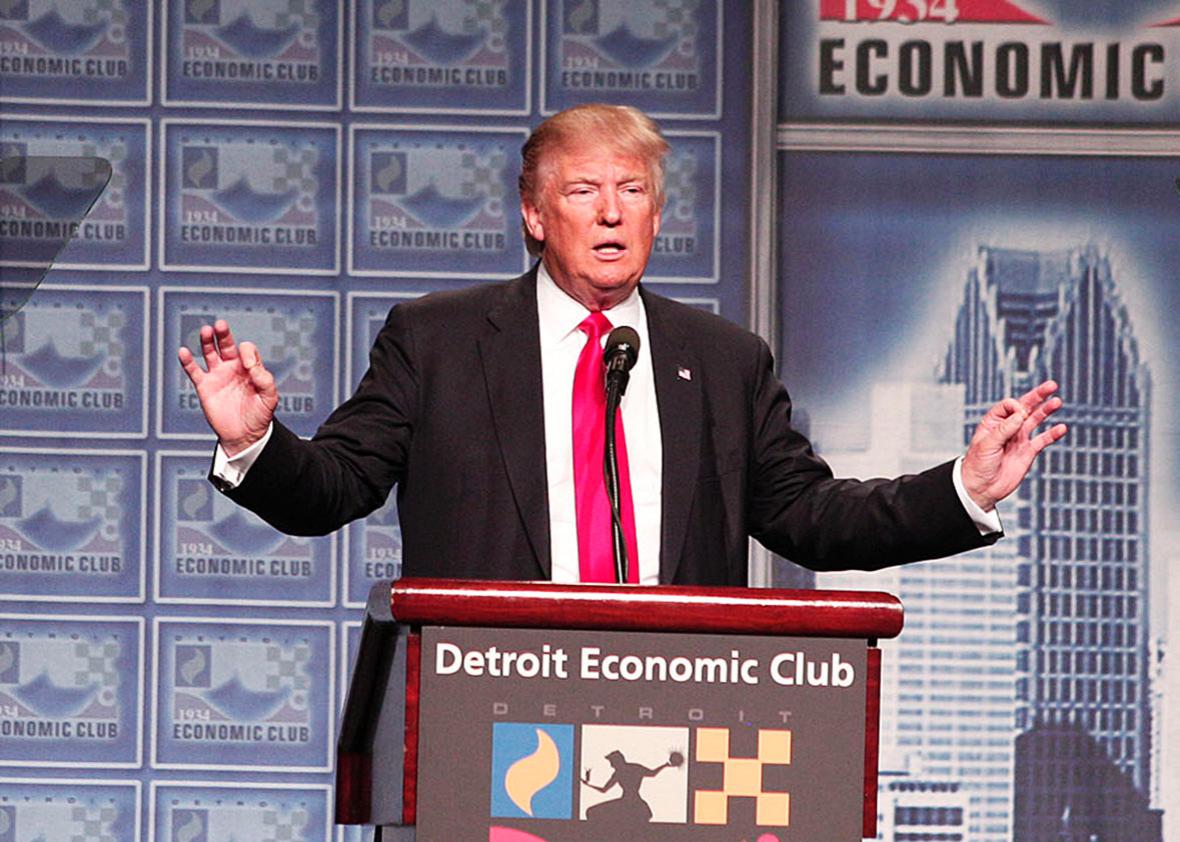Donald Trump’s decidedly laid-back speech to the Detroit Economic Club was meant to provide a vision of the economic future we would all be blessed with during a Trump administration. Ostensibly about cutting taxes and slashing regulation—the cornerstones of Trump’s economic agenda, no matter how many times he is referred to as a populist—the speech mostly served as an attack on Hillary Clinton’s economic policies. Its relatively straightforward and un-Trumpian delivery (he didn’t even resort to calls for violence during numerous interruptions by protesters) was meant to mark the start of a new phase in the candidate’s stumbling campaign. Instead, it merely highlighted the artifice and effort required to make Trump sound like a normal human being for an hour.
Painting a picture of economic decline and doom—lost jobs, declining wages, inequality—has been a mainstay of nominees’ speeches for decades. But this one was particular Trumpian. He talked about crime and immigration policies hurting opportunity in Detroit; he referenced government money being sent to refugees when it could have been dispatched to hardworking Americans; he spoke darkly of foreign actors seeking to weaken America. And despite the fact that the speech was carefully scripted, several of his flourishes remained. “Big increase,” Trump said about Clinton’s tax plan. “One of the biggest ever.”
Indeed, the attack on Clinton was the only sustained theme of the speech, something normal for a campaign event but out of place in a talk billed as a major policy address. Trump is simply incapable of offering a positive vision of his own: He can only offer himself up as the negative space of the people he and his supporters hate—mostly Clinton, but also her husband and President Barack Obama. He discussed Clinton’s belief in “radical regulation” and even brought up her use of the term “short circuit” to imply that she is mentally unbalanced. (Psychiatrists have a word for this.)
The details of Trump’s policy proposals, or at least the ones that were offered, were predictable but not worth examining with a magnifying glass. (He offered specific tax brackets that were different than ones he had previously offered. Asking why is probably futile.) His attack on regulation—and his pledge to put a temporary moratorium on new Cabinet-agency regulations—was no doubt a sign that Trump has been paying attention to his new team of right-wing economic advisers. (When he lightly touched on things like a child care deduction, he did so with no energy and very little detail.) This was a speech, then, that was meant for Republican bigwigs as much as for passionate Trump voters, but mixed in with a typically libertarian agenda were the familiar themes of bad trade deals and seething foreigners.
As Trump’s advisers have enunciated over the past several days, the goal of Monday’s speech was to reverse Trump’s slide in the polls and give nervous Republicans a sense that Trump can be reined in and directed to focus on Hillary Clinton—and a positive economic agenda. It’s not worth wondering whether Trump will go off the reservation again soon, because of course he will. But it continues to amaze that the guy can appear relatively sane only during those rare moments when his campaign has planned a big speech and prepared the media for days. (The last one was about foreign policy, and Trump gave it in the same relatively relaxed way.) He’s like an actor who puts everything into a night onstage and then hibernates for the next month. Except, as this campaign has revealed with frightening clarity, Trump doesn’t hibernate after a performance. No, he lets his dark id reign.
